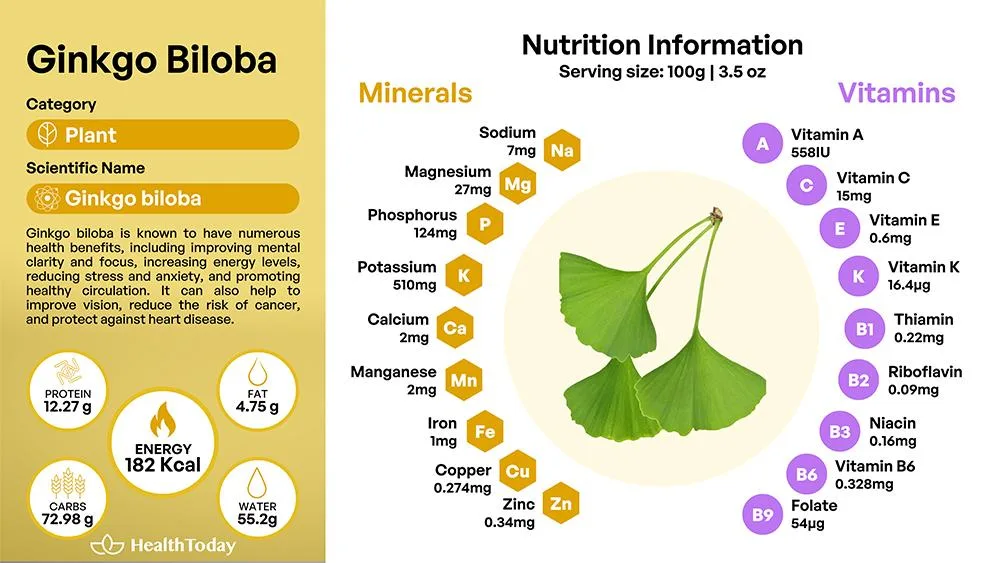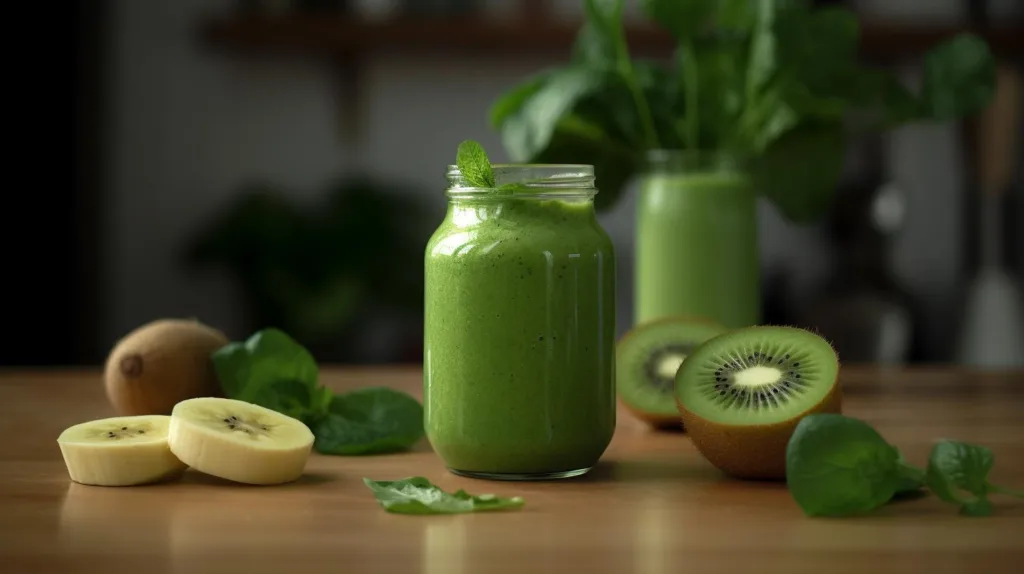Table of Contents
Ginkgo biloba is one of the most popular herbal supplements. It’s not only an ancient tree species, but its use in traditional Chinese medicine dates back over 2,000 years. The general belief is that taking ginkgo biloba extract can enhance overall wellness, blood flow, and cognitive decline. Most of this ancient plant wisdom still holds true today. Before you decide to take ginkgo biloba, find out what exactly it can do for you, the correct dosage, and things you need to be careful of.
Essential Nutrients in ginkgo biloba
Ginkgo biloba plant extract contains high levels of vitamin C, carbohydrates, proteins, and other nutrients. Its health benefits include cancer prevention, improved blood circulation, and treating neurologic conditions (1).
Key nutrients found in 100 g of ginkgo biloba extract:
- Sodium 7 mg
- Potassium 510 mg
- Calcium 2 mg
- Vitamin C 15 mg
- Magnesium 27 mg
- Sodium 7 mg
- Phosphorus 124 mg

Ginkgo biloba in traditional Chinese medicine
The ginkgo is one of the oldest living tree species in the world. It dates back some 248 to 286 million years, but ginkgo biloba is the only surviving ginkgo family member.
In traditional Chinese medicine, and also in Japan, ginkgo extract and leaves have been used to treat mostly respiratory issues like asthma and coughs.
It’s also used in traditional medicine as a treatment for enuresis or bed-wetting, diabetes, and thromboses (2, 3, 4), though more research supporting these treatments is needed.
Ginkgo leaves were always recommended for memory loss and cognitive disorders. Other traditional uses include heart ailments like arrhythmias—irregular heartbeat—and ischemia, or the sudden loss of blood flow to any part of the body.
Gingko also features in traditional Chinese and Japanese foods like sweet barley and ginkgo nut soup. Roasted ginkgo seeds are likewise used in glazed vegetables, drinks, and other baked goods.
Ginkgo biloba extract in modern medicine
Ginkgo biloba extract is one of the most popular botanical dietary supplements on the market today (2).
In Norway, ginkgo leaf extract is approved by the Norwegian Medicines Agency for improving blood circulation especially affecting cold hands and feet (4).
In other places in the world, ginkgo is widely used for cognitive impairment and dementia. It is used as a treatment for acute ischemic stroke, tinnitus, and age-related illnesses (4).
How to choose high-quality ginkgo biloba
The quality of ginkgo biloba preparations produced by various manufacturers varies greatly, more specifically in its organic acids (5).
Here are the best tips for choosing high-quality ginkgo biloba:
- Look for a standardized ginkgo biloba extract to ensure consistently good flavonoids and terpenoid content.
- Check the label and try to keep away from products with additives like fillers, synthetic flavors, and colors.
- Choose a brand with a good reputation for quality and food safety.
How much ginkgo biloba is safe to take
The maximum recommended dose for ginkgo extract is 240 mg per day (6). This is also the dosage that is used widely in clinical studies.
The typical dosage for patients with dementia is 40 mg of the extract three times each day (7).
For improving cognitive function in healthy people, clinical studies have used 120 mg of the extract daily as a safe dose (7).
Ginkgo biloba is generally available in the following forms:
- Capsules
- Tablets
- Liquid extracts
- Dried leaves/tea
Gingko for the brain
Ginkgo biloba is often known as the ‘brain herb.’ This is because research has found the effects of ginkgo biloba to be largely neurological. Find out how ginkgo can reduce anxiety, improve cognitive function, and help with depression.
1. Neuron protection and anxiety
Studies show that ginkgo biloba can protect neurons and help regulate neuro-transmission, among other neuro functions. Research has shown that ginkgo may be able to reduce anxiety symptoms through this mechanism (1). Another study showed positive results for young people with anxiety mood disorders (8).
2. Improved brain health
Many studies also show that taking ginkgo biloba supplements can help with cognitive decline. It can prevent memory loss in healthy people and help with age-associated memory impairment (9).
A study in 1997, for example, was done on patients with dementia. Ginkgo biloba extract taken over a period of six months to a year was able to stabilize and improve cognitive performance (6, 7).
3. Reduced symptoms of depression
Experts recommend taking ginkgo biloba extract for some psychiatric disorders as part of a complementary and integrative health program. This is mostly for depression and anxiety, but to date, outcomes are inconclusive (8).
In one trial specifically, older people with post-stroke depression took ginkgo biloba extract together with an antidepressant for eight weeks. They showed much fewer depressive symptoms compared to those who only took an antidepressant alone (10).
It is believed that ginkgo biloba interacts with the body’s dopamine, serotonin, and norepinephrine signals. Furthermore, flavonoids and terpene found in ginkgo can act as antioxidants to protect neurotransmitters in the brain (11).
4. ADHD and ginkgo biloba research
While ginkgo biloba has been proposed to treat ADHD, current evidence is not supportive. However, one study at least suggested that its effects were not as effective as compared to the common treatment of methylphenidate (12). A further systematic review found ginkgo biloba an ineffective therapy for ADHD (13).
Ginkgo improves blood flow
One key property of ginkgo is that it is able to improve blood flow. For this reason, it has been studied as a potential treatment for a number of ailments. However, for the most part, a lot more research is needed.
1. Blood flow and vision
Ginkgo biloba may be able to help with certain visual issues in older persons (6). It is believed to improve blood flow to the eyes, thereby protecting the retina and other structures from damage (14). However, studies are not conclusive enough to warrant ginkgo biloba as a treatment for impaired vision.
2. Circulation and heart health
Metabolism regulation is one of Ginkgo’s main effects. It can open the pathway of blood vessels that reduces tissue-damaging inflammatory conditions such as ischemia or the sudden loss of blood flow (6).
A 2008 study showed that ginkgo biloba could help with coronary artery disease treatment by increasing general blood flow in the body (16).
3. Peripheral artery disease
A condition known as peripheral artery disease (PAD) results from diminished blood flow to the legs, arms, or pelvis. The use of ginkgo biloba supplements in controlling PAD has been the subject of many investigations.
The results have been positive, with improved blood flow and reduced inflammation (15). According to one PAD study, six months of treatment saw significant improvements in walking distance and relief of pain and cramps while walking (7).
4. Studies in tinnitus
Tinnitus is a ringing or other disturbance heard in one or both ears. Some people think ginkgo biloba may lessen these symptoms due to its ability to increase blood flow and decrease inflammation.
However, several studies have found no evidence of ginkgo biloba’s significant benefit in tinnitus patients (6). More research is needed especially concerning dosage and effective periods of treatment.
Gingko and sexual health
Ginkgo has also attracted interest as a possible treatment for various sexual functions. This is also largely related to its ability to increase blood flow and a few other effects.
1. Minimal effect on sexual function
According to some research, long-term ginkgo biloba use may have a positive effect on enhancing sexual desire in premenopausal women (6).
However, these women also received supplements that included other nutrients, so it is hard to decipher if the results were due to ginkgo biloba. This possible effect is believed to come from increased nitric oxide levels.
Other research shows it may boost blood flow to the genitals for improved sexual performance. However, the study showed no increase in sexual function when given ginkgo biloba over the short or long term compared to placebo (17).
There is insufficient evidence for impacts on sexual function, and further research is required.
2. Reduced symptoms of PMS
For a long time, experts have been studying ginkgo biloba as a potential premenstrual syndrome (PMS) treatment. A 2008 study on a group of women with PMS reported significantly reduced symptoms when using ginkgo biloba leaf extract as compared to placebo (18).
The research is not entirely conclusive, especially with some symptoms such as breast tenderness and mood fluctuations.
Gingko reduces inflammation
Gingko’s anti-inflammatory properties are also well appreciated. These often work in conjunction with other properties, especially ginkgo’s ability to improve blood flow. Effective uses studied have been for skin reactions, asthma, and anti-cancer therapy.
1. Flavonoids and inflammation
Flavonoids, such as those found in ginkgo, are well-known for controlling inflammatory responses in the body. These substances act as antioxidants which protect against free-radical damage (2, 3).
This may be able to help with chronic inflammatory-type diseases. However, further research is needed to discover the best dosages and durations for ginkgo biloba use.
2. Improved skin health
Flavonoids and terpenoids in ginkgo biloba leaf might help with inflammatory skin conditions. Ginkgo has also been used to treat re-pigmentation of skin in vitiligo patients. In a double-blind study, re-pigmentation was achieved in 40% of patients compared with 9% of the control group (9).
3. Potential for asthma relief
Nearly 5,000 years ago in China, ginkgo was mainly used for treating asthma. By reducing airway inflammation, ginkgo biloba may help people with asthma symptoms like coughing, wheezing, and shortness of breath (19).
Modern studies have reported some improvements with mild-to-moderate asthma when compared to a placebo group. However, no significant differences were found in other investigations (20, 21).
To date, there is inadequate evidence to suggest it as an asthma treatment.
4. Ginkgo as a cancer-fighter
There are mixed results for studies of ginkgo in fighting cancer. Some noted anti-cancer effects include repairing damaged chromosomes and reducing tumor size. More specifically, ginkgo may help in fibrosis-related cancer and free radical-induced cancer (22).
However, other studies showed opposite results for breast and colon cancers and have pro-cancer properties. This can be due to components in ginkgo extract that have a certain degree of toxicity (23).
Therefore, more studies on the toxicity of ginkgo extract are needed.
Potential interactions with medications
Many botanical dietary supplements have been associated with significant health risks, especially if you are taking other medications (23).
For example, people who take aspirin, warfarin, trazodone, or omeprazole should not use ginkgo. Ginkgo can reduce the effectiveness of these drugs (23).
Gingko can also increase the risk of bruising and bleeding (24). It can interact with anticoagulants or antiplatelet drugs (25).
General adverse effects
Ginkgo leaf extract can cause minor stomach upset, headache, dizziness, constipation, and allergic skin reactions (25). Headaches and gastrointestinal disturbance were also reported in several trials (26).
Ginkgolic and allergy-inducing acids can lead to vitamin B6 deficiencies. It’s best not to use ginkgo as an everyday food (1).
Blood-bleeding incidents, including serious intracranial hemorrhage, have reportedly been linked to ginkgo use (6).
Is ginkgo biloba safe for pregnant or breastfeeding women?
In animal studies, ginkgo biloba has been associated with various severe and adverse events. If you are pregnant, it’s best to avoid taking ginkgo biloba.
What is the best and safest ginkgo biloba supplement to buy?
The usage of EGb 761, or standardized ginkgo biloba extract, has not yet received FDA approval in the United States. However, it is available via prescription in European countries.
Is it good to take ginkgo biloba every day?
A dose of 120 mg to 240 mg is considered safe for healthy people for a period of six months to one year. It’s best, however, to consult a healthcare professional. This way, you can avoid any serious interactions or side effects.
Does ginkgo extract affect testosterone?
Research on ginkgo biloba’s impact on human testosterone levels is limited and inconclusive. There have been various positive effects in animal studies, but human trials are lacking.
Can ginkgo biloba cause kidney problems?
There is insufficient evidence that ginkgo biloba can help with kidney problems. It has only been shown to reduce hypertension by kidney damage in animal models. Consult your doctor before using ginkgo biloba.
Is ginkgo biloba hard on the liver?
Ginkgo biloba may have negative effects on liver function in some people. Studies, however, have only been done on rats and mice. These have shown various adverse events, but ginkgo is considered generally safe for humans in recommended dosages.
Summary
Gingko is an ancient herbal plant that has been used for thousands of years. Some of its most noted properties are protecting neurons, increasing blood flow, and providing potent antioxidants. It can be used to improve memory and cognition and blood circulation problems affecting the heart and eyes. Other conditions it may help with are PMS, inflammatory-related diseases, including cancer, and asthma relief. You should stick to recommended dosages and exercise caution for certain conditions or medications.

















Comments
0